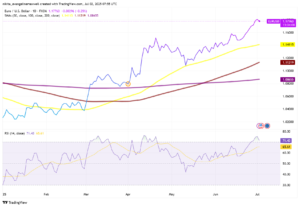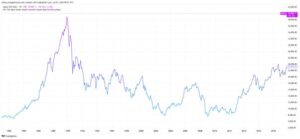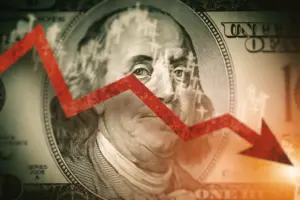The Bank of Japan (BOJ) is signaling a more hawkish stance than expected. Although the central bank left interest rates unchanged during its last policy meeting, Governor Kazuo Ueda’s comments suggest a possible rate hike as early as the May meeting, driven largely by persistently high food inflation.
Japan’s food prices have remained elevated for years, and recent data shows core inflation hit 3.0% in February, while food prices surged 5.6% year-over-year. The price of rice alone soared over 81%, the fastest increase in nearly half a century. Ueda warned that these trends are shaping public expectations, no longer being viewed as temporary supply shocks.
“Sticky food prices are starting to affect inflation sentiment,” Ueda said. “We cannot afford to ignore the risks.” This shift in tone signals that the BOJ may hike earlier than the market expects, potentially even in May, rather than waiting for Q3 as previously thought.
While other central banks like the Federal Reserve and ECB are preparing for rate cuts amid slowing growth, Japan may go against the trend. Analysts believe that the combination of high food prices and anticipated wage hikes will continue to push inflation higher, making a stronger case for policy tightening.
Further complicating matters is the global backdrop. U.S. President Donald Trump’s new round of tariff threats has raised uncertainty about global trade and economic growth. While Ueda acknowledged these risks, he emphasized that Japan’s monetary policy will be driven by domestic data, especially inflation and wages.
During the latest BOJ meeting, some board members reportedly raised concerns about inflation overshooting, highlighting growing internal support for policy normalization. Ueda added: “If risks to inflation rise further, we must be ready to act faster than expected.”
Still, the BOJ is not rushing. Service-sector inflation remains modest at 1.3%, and long-term inflation expectations are still close to the bank’s 2% target. Therefore, the central bank is likely to wait for further confirmation before making its next move.
Most analysts currently expect the BOJ to raise rates in July, but recent developments point to an increased chance of a May hike if inflationary pressures and wage growth continue.
Atago, Chief Economist at Rakuten Securities, remarked: “Ueda’s tone feels like May is very much live. When prices for daily essentials surge for an extended period, the BOJ must respond decisively.”
In summary, Japan’s central bank is at a critical juncture. With inflation pressures mounting and global uncertainties rising, the BOJ may soon begin exiting its ultra-loose policy stance. Market participants should pay close attention to incoming wage and price data, which will likely dictate the yen’s trajectory and bond market behavior.





